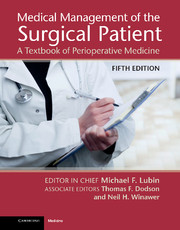Book contents
- Frontmatter
- Dedication
- Contents
- List of Contributors
- Preface
- Introduction
- Part 1 Perioperative Care of the Surgical Patient
- Part 2 Surgical Procedures and their Complications
- Section 17 General Surgery
- Section 18 Cardiothoracic Surgery
- Section 19 Vascular Surgery
- Section 20 Plastic and Reconstructive Surgery
- Section 21 Gynecologic Surgery
- Section 22 Neurologic Surgery
- Section 23 Ophthalmic Surgery
- Section 24 Orthopedic Surgery
- Section 25 Otolaryngologic Surgery
- Chapter 127 Otologic surgery
- Chapter 128 Tympanotomy tubes
- Chapter 129 Tonsillectomy and adenoidectomy
- Chapter 130 Surgery for obstructive sleep apnea
- Chapter 131 Endoscopic sinus surgery: indications, prognosis, and surgical complications
- Chapter 132 Aesthetic facial plastic surgery
- Chapter 133 Surgical treatment of head and neck cancer
- Chapter 134 Reconstruction after cancer ablation
- Chapter 135 Surgical management of thyroid malignancies
- Chapter 136 Anterior cranial base surgery
- Chapter 137 Acute airway emergencies
- Section 26 Urologic Surgery
- Index
- References
Chapter 133 - Surgical treatment of head and neck cancer
from Section 25 - Otolaryngologic Surgery
Published online by Cambridge University Press: 05 September 2013
- Frontmatter
- Dedication
- Contents
- List of Contributors
- Preface
- Introduction
- Part 1 Perioperative Care of the Surgical Patient
- Part 2 Surgical Procedures and their Complications
- Section 17 General Surgery
- Section 18 Cardiothoracic Surgery
- Section 19 Vascular Surgery
- Section 20 Plastic and Reconstructive Surgery
- Section 21 Gynecologic Surgery
- Section 22 Neurologic Surgery
- Section 23 Ophthalmic Surgery
- Section 24 Orthopedic Surgery
- Section 25 Otolaryngologic Surgery
- Chapter 127 Otologic surgery
- Chapter 128 Tympanotomy tubes
- Chapter 129 Tonsillectomy and adenoidectomy
- Chapter 130 Surgery for obstructive sleep apnea
- Chapter 131 Endoscopic sinus surgery: indications, prognosis, and surgical complications
- Chapter 132 Aesthetic facial plastic surgery
- Chapter 133 Surgical treatment of head and neck cancer
- Chapter 134 Reconstruction after cancer ablation
- Chapter 135 Surgical management of thyroid malignancies
- Chapter 136 Anterior cranial base surgery
- Chapter 137 Acute airway emergencies
- Section 26 Urologic Surgery
- Index
- References
Summary
Head and neck cancer comprises about 3–6% of all cancers in the USA. Despite the relatively small numbers, it can have great effects on appearance and affects important functions of daily living, such as speech and swallowing. For the purposes of this discussion, only the oral cavity, pharynx, larynx, and the neck will be covered.
The treatment of head and neck cancer is best undertaken by a multidisciplinary team of physicians and others, including head and neck surgeons, oral surgeons, medical oncologists, radiation oncologists, and diagnostic radiologists. Other important members of the team include speech and swallowing therapists, nurses and nurse practitioners, dieticians, social workers, and physician assistants. The team usually meets regularly to discuss the patients who have been seen recently or to discuss follow-up and status of patients after treatment. The multidisciplinary approach provides the patient with a comprehensive plan developed from many different perspectives. The treatment of a patient with head and neck cancer is frequently demanding, regardless of the method; careful attention to detail and to the subtleties of treatment is necessary to optimize the outcome.
- Type
- Chapter
- Information
- Medical Management of the Surgical PatientA Textbook of Perioperative Medicine, pp. 770 - 772Publisher: Cambridge University PressPrint publication year: 2013



